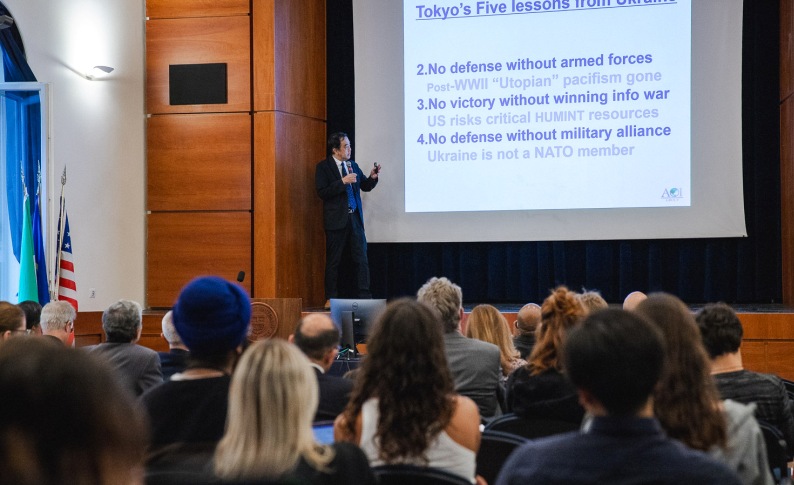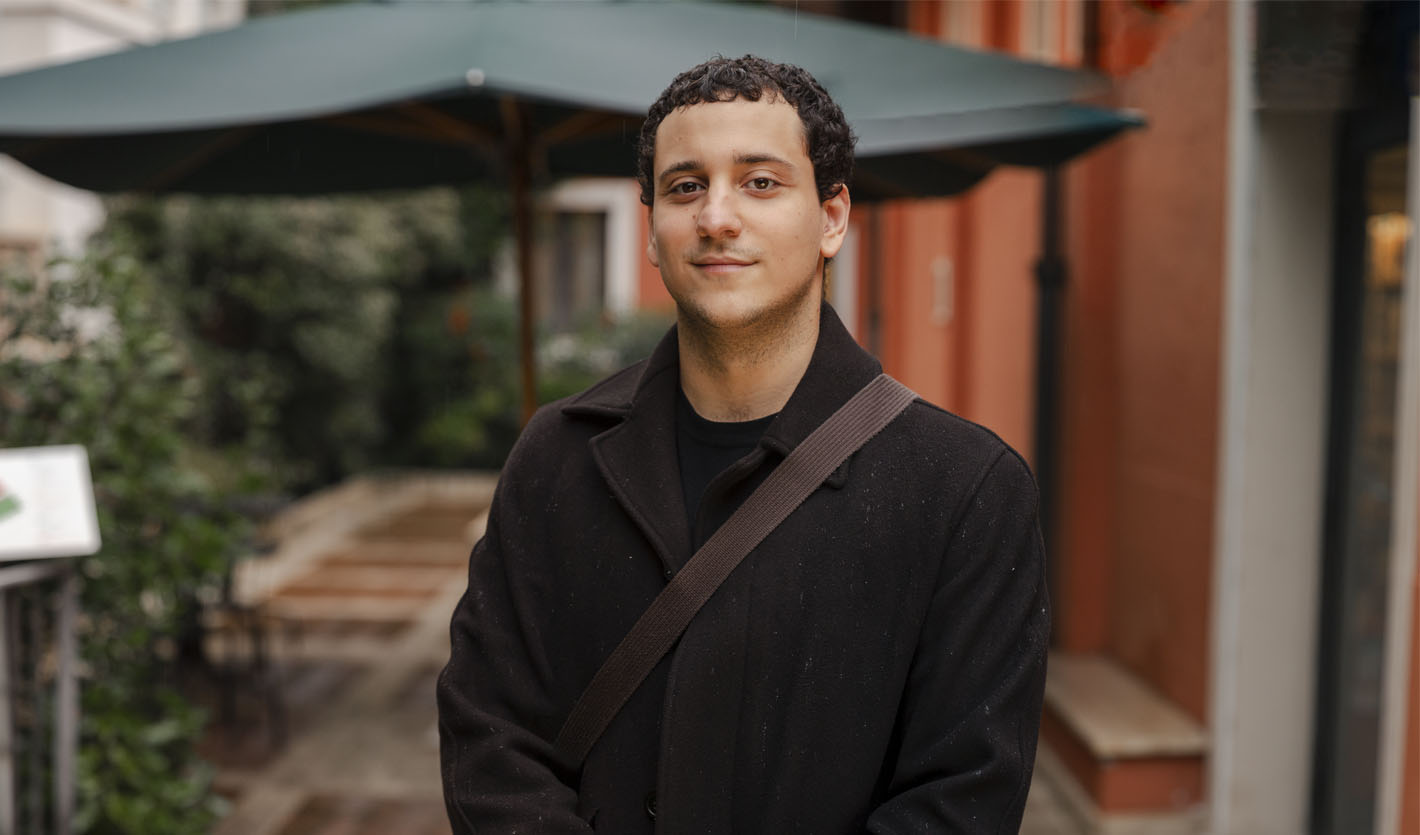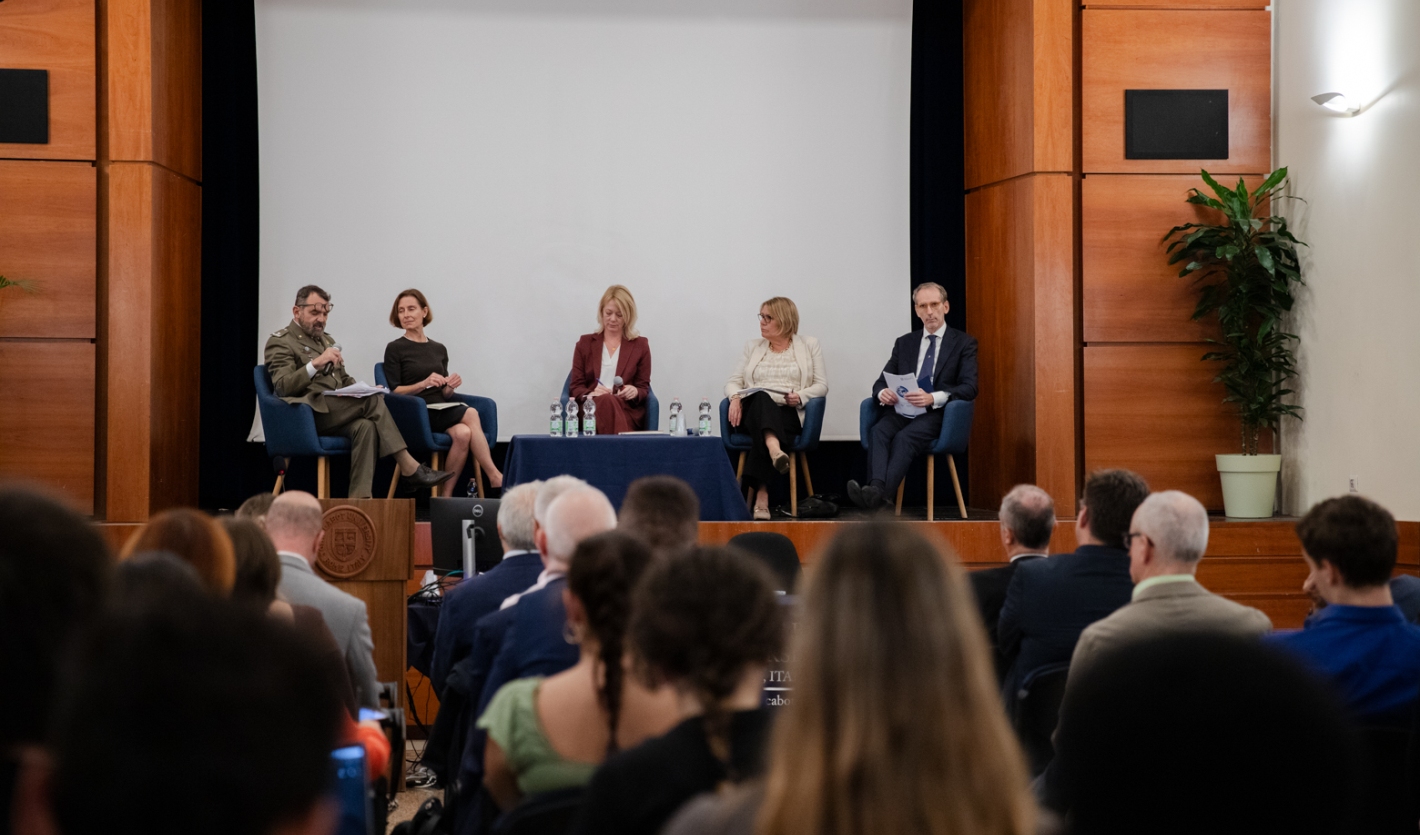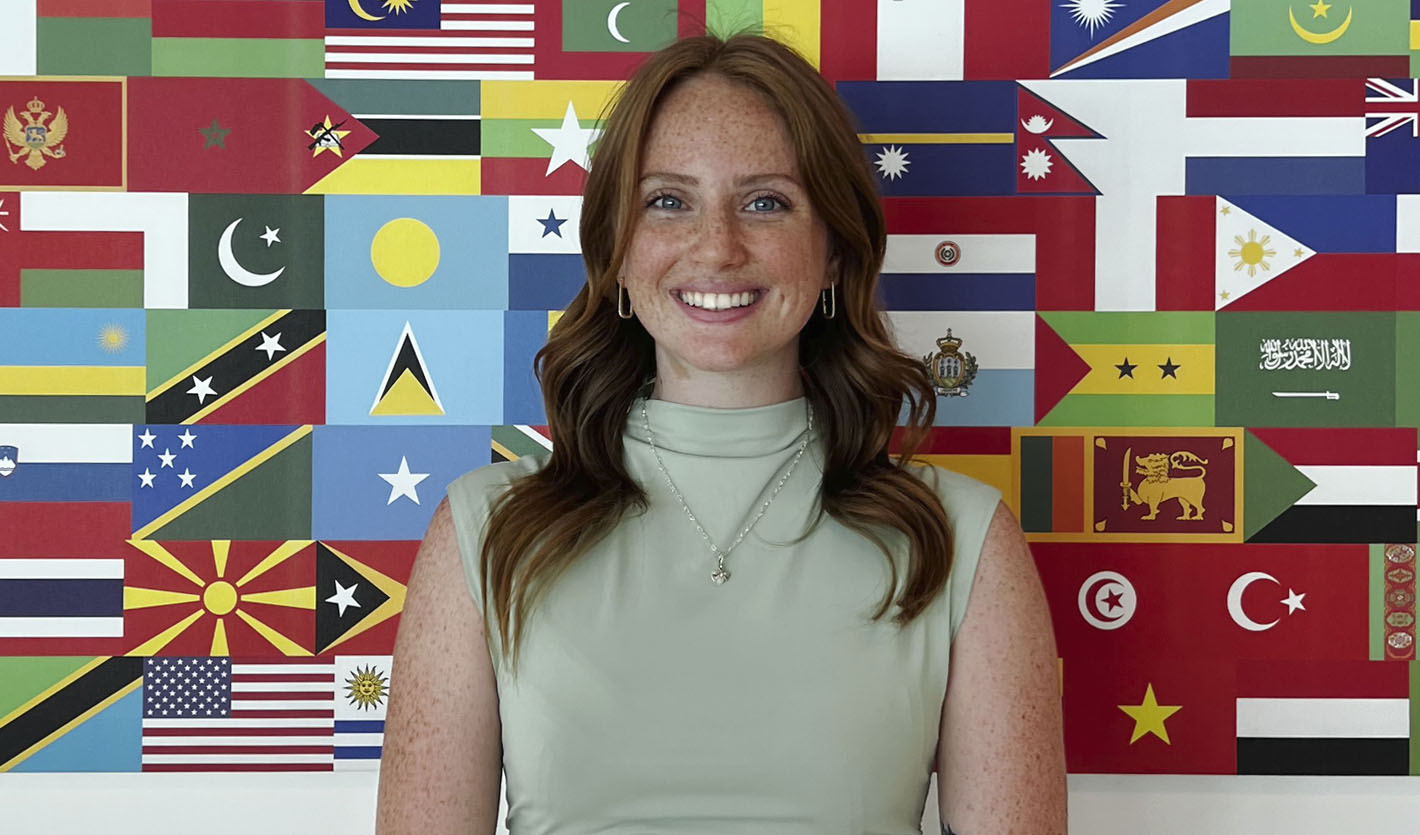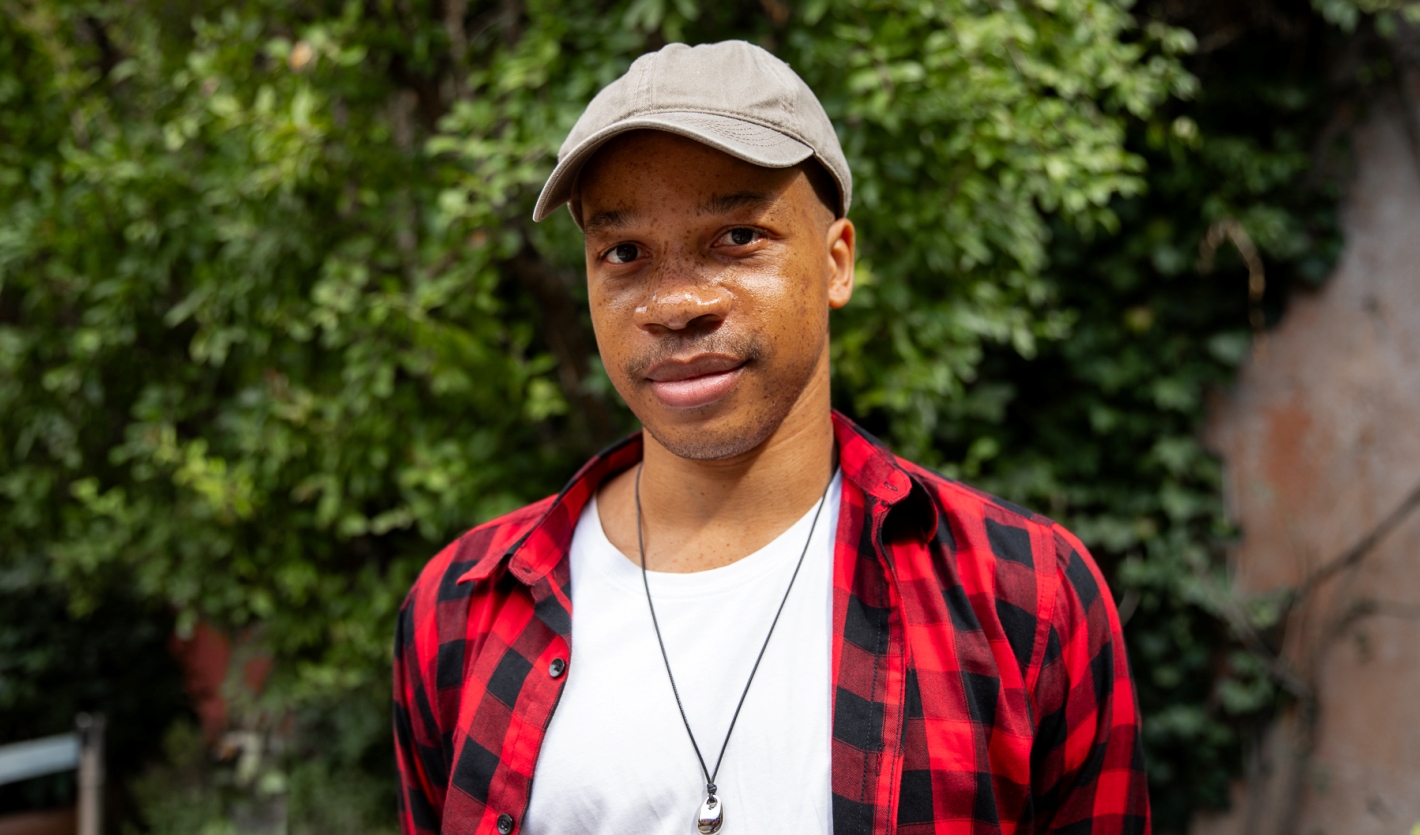
Make your mark on global politics with an MA from JCU. Become part of a supportive academic community in Rome, a major center for policymaking, connecting Europe, the Mediterranean, and the Atlantic.
The Master of Arts in International Affairs program at John Cabot University offers a thorough, advanced education that equips you with the knowledge, skills, and practical experience necessary for success in the global arena. Our program covers foundational concepts while providing in-depth expertise in critical areas such as international politics and human rights.
Learn in small classes guided by professors who will help you navigate complex subjects, ensuring a personalized and engaging academic experience. You will gain insights into how international organizations operate and address global challenges and how to successfully navigate and succeed in that world. After completing the program, you'll be well-prepared to be a leader in professional policy work.
Join a program crafted to equip you with the expertise and skills essential for a successful career in global affairs. Our internationally renowned faculty and practitioners will guide you through a dynamic curriculum, blending theory and practice.
In this video, Professor Michael Driessen presents the Master of Arts in International Affairs at JCU, where excellence meets experience.
Knowledge and understanding
Analytical and research skills
Professional and transferrable skills
Choose a path to earning your master's degree that best aligns with your goals: complete the program in just one year through the accelerated track or take a more flexible approach by finishing in three semesters of full-time study.
The M.A. program curriculum is designed to provide you with the courses, training, and skills necessary for either an academic, research-oriented career or a professional, policy-making one. The program begins with a Foundation Phase that lays the groundwork for advanced research and practice, followed by the Capstone Phase, during which you will complete your M.A. Thesis.
To complete the degree, you must earn a total of 36 credits, distributed according to the program's requirements. Additionally, you must maintain an overall minimum grade point average (GPA) of 2.00 for all courses taken at the university. You are allowed no more than two grades lower than C- in the core courses required for the degree.
Language Proficiency Requirement: MA students must demonstrate proficiency in a second language beyond English at the B2 (upper intermediate) level or higher in the Common European Framework of Reference for Languages (CEFR).
A. Core Curriculum (24 credits)
B. Additional Requirements (0 credit hours each)
Cultural Events Modules (PL603-Fall semester, PL603-Spring Semester). A passing grade in two semesters of PL603 is required for admission to register for the M.A. Thesis.
C. Capstone requirements (12 credits)
Note: Payment of all financial obligations to the University is required to be awarded the degree.
Learn more about the courses you'll take in the M.A. program.
Stay on track with important dates for each semester.
JCU provides several options to support you in achieving your educational goals. All program applicants are automatically considered for our scholarships and grants. In addition, there are student loan options to help you pay for school, as well as veteran and military family benefits.
As a graduate student, you will study and attend classes at JCU's Center for Graduate Studies, located in the historic Foresteria building. This site dates back to 1495, when it was initially built as the residence of Cardinal Alessandro Farnese, who later became Pope Paul III. In the early 19th century, the building was passed into the hands of the powerful Bourbon family. Since 1934, it has been part of the renowned Accademia dei Lincei, the world’s oldest academy dedicated to the study of the humanities and natural sciences. Among its distinguished members were intellectual giants such as Galileo Galilei, Enrico Fermi, and Vito Volterra.
The M.A. program in International Affairs at John Cabot University was made possible by a generous donation from the Hon. Frank J. Guarini, Chairman Emeritus of the JCU Board of Trustees. Mr. Guarini has been an avid supporter of JCU since 1995, and his career in both public service and education has left a lasting impact on the university.
Mr. Guarini's generosity also helped to establish the Guarini Institute for Public Affairs, which offers enriching lectures, seminars, and networking events that can enhance your education and provides opportunities to connect with visiting political and business leaders.
JCU's Center for Career Services is a valuable resource dedicated to helping you prepare for the workforce and find a career. From internships to networking events to career fairs, you'll find numerous opportunities to stand out and learn more about rewarding careers in politics and international affairs. Be sure to also take advantage of JOBIRI, our artificial intelligence job/career platform.
The MA program in International Affairs hosts, co-hosts, or organizes a series of research projects and summer institutes that you may participate in as part of your coursework. Program topics include Migration and Rights, China and Europe, Religion and Global Politics, and Global Peace and Security.
JCU's Transatlantic Policy Dialogues is an ongoing policy workshop that aims to evaluate the evolving geopolitical challenges and opportunities facing Europe and the United States from a transatlantic perspective.

Simultaneously earn an MA in International Affairs and a Laurea Magistrale (LM) in Relations and Institutions of Asia and Africa in just two years. Begin your studies at JCU; once you've earned at least 30 US/60 CFU credits, transfer to L'Orientale University to complete your registration. Upon completion of all requirements, you'll earn both degrees and be amply prepared for a standout career. You must apply and be accepted to both programs separately.
Learn from dedicated professors who have worked in international organizations, global development, and diplomacy.
From your foundation year to graduation, discover what to expect from your JCU Master's education.
The Foundation Year of your graduate education consists of:
In total, you will complete twenty-four credit hours of coursework for your degree. Additionally, you must fulfill a public lecture attendance requirement, which entails attending at least three scholarly lectures, workshops, or other approved events each semester. You may satisfy this requirement by participating in the M.A. program’s speaker series or by attending one of the numerous academic events held throughout Rome.
Students must also demonstrate proficiency (at the B2 level) in a second language other than English.
The summer term provides an excellent opportunity to take additional courses that count toward your degree. You can use this time to complete your practicum and professional development courses, pursue an internship, or conduct research for your thesis, including any necessary travel. JCU offers a range of summer programs that may also fulfill your practicum requirement.
During the capstone term, you will complete your M.A. Thesis (6 credit hours), the final requirement for your degree. Students typically form their thesis based on a research project completed during the Foundation year in one of their graduate research seminars or in elective courses.
You'll also complete your International Affairs Practicum (2 credit hours), Professional Development Course (1 credit hour), and your Research Assistantship or Professional Internship (3 credit hours total). If you are interested in an academic career, you are encouraged to pursue a research assistantship with one of JCU’s active research faculty.
If you are interested in a professional career in international affairs, you are encouraged to pursue a professional internship. The University currently has internship agreements with a range of international organizations and governmental entities in Rome. John Cabot students in international affairs have previously held internships with the US Embassy to Italy, the United Nations World Food Programme (WFP) and Food and Agricultural Organization (FAO), the International Food and Development Bank (IFAD), the Italian Institute of International Affairs (IAI), the Italian Carabinieri’s Center of Excellence, as well as major Human Rights organizations and law firms, Vatican institutes and Italian state ministries.
Learn more about John Cabot University’s Office of Career Services and the assistance it provides students with internship placement and post-graduate professional planning.
Graduate Seminars are research-intensive colloquia focused on specialized themes devised to stimulate original student research. They begin with the reading of a discrete body of scholarly sources and the examination of source material and proceed to the development of a focused research project, presentation, and paper by each seminar participant. Weekly seminar meetings are devoted to analyzing readings and presenting and discussing the results of individual research.
Political Science Research Methodology, a course required of all MA students, provides a systematic understanding and critical appreciation of alternative approaches, methodologies, and paradigms of political science research. Students will learn techniques to interpret and analyze data. The tool-driven training will enable students to think through how they can use their knowledge and skills of advanced qualitative and quantitative methods in different contexts, apply them to a variety of problems, and, progressively, identify their own needs for research.
The Practicum in International Affairs provides a hands-on introduction to policy work in global affairs. Practicums feature participation by high-level practitioners with experience in areas like the United Nations, Foreign and Defense Ministries and international advocacy organizations. The course is designed to introduce students to the professional world of international affairs and engage with the networks of policymakers present in the city of Rome.
Proficiency in a Foreign Language: Given the international nature of policy-making as well as John Cabot’s traditional identity as a hub for intercultural relations, M.A. students must demonstrate proficiency in a second language beyond English at the B2 (upper intermediate) level or higher in the Common European Framework of Reference for Languages (CEFR). This component can be satisfied by passing a language exam administered by the John Cabot University Foreign Language Resource Center or by presenting a B2-level certificate from an approved language school or testing service (CILS, DELF/DALF, etc.). John Cabot offers multiple language resources through its library and Foreign Language Resource Center to help students work towards this requirement. JCU also regularly offers language instruction in Italian, French, and Spanish, and M.A. students may audit JCU language courses as schedules permit.
The program offers two options:
At the beginning of the program, you will choose and commit to one of the two timetables. Students who have legal status to live in Italy may opt for part-time study.
Over the summer, you may take additional coursework, internships, thesis research, supplementary language training, and other professional or educational activities, including the JCU-UNICRI Summer School on Migration and Human Rights, the Rome Summer Seminars on Religion and Global Politics, and the TOChina Summer School.
| Fall semester I | Spring semester I | Fall semester II |
|---|---|---|
| Foundation I: International Relations (3 credits) | Foundation II: Comparative Politics (3 credits) | Research Assistantship or Professional Internship (3 credits) |
| Political Science Research Methodology (3 credits) | International Political Economy (3 credits) | Professional Development Course (1 credit) |
| Graduate Seminar I (3 credits) | Graduate Seminar III (3 credits) | International Affairs Practicum (2 credits) |
| Graduate Seminar II (3 credits) | Graduate Seminar IV (3 credits) | MA Thesis (6 credits) due in December |
| Fall Semester | Spring semester | Summer |
|---|---|---|
| Foundation I: International Relations (3 credits) | Foundation II: Comparative Politics (3 credits) | Research Assistantship or Professional Internship (3 credits) |
| Political Science Research Methodology (3 credits) | International Political Economy (3 credits) | Graduate Seminar IV (3 credits) |
| Graduate Seminar I (3 credits) | Graduate Seminar III (3 credits) | MA Thesis (6 credits) due in September |
| Graduate Seminar II (3 credits) | Professional Development Course (1 credit) | |
| International Affairs Practicum (2 credits) |
Please consult the Academic Calendar for Thesis deadlines.
If you are a European Union (EU) citizen or have an Italian permit of stay (permesso di soggiorno), you are eligible for admission as a part-time student. Part-time students typically take between three and nine credit hours per term and are allowed four years to complete all degree requirements.
The MA in International Affairs degree serves as a foundation for pursuing careers in international affairs. You will graduate prepared to begin work in international governmental organizations, international non-governmental organizations, governmental foreign and Defense Ministries, international consulting, finance and legal firms, as well as public service and civil society organizations. You will also be prepared for further graduate and post-graduate scholarly work.
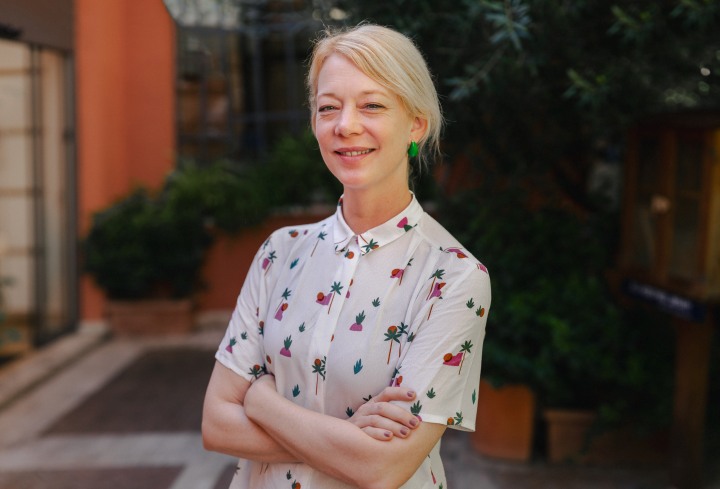
Graduates of the MA in International Affairs program pursue careers at organizations like the UN and the World Bank or in government agencies, nonprofits, and international consulting firms.
The skills and knowledge you gain in the program will prepare you for work in fields such as: business, civil society organizations, government, global organizations, finance, legal firms, international consulting, non-profit, public service.
